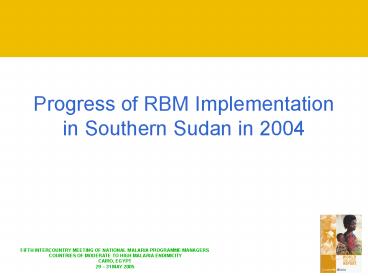FIFTH INTERCOUNTRY MEETING OF NATIONAL MALARIA PROGRAMME MANAGERS - PowerPoint PPT Presentation
1 / 17
Title:
FIFTH INTERCOUNTRY MEETING OF NATIONAL MALARIA PROGRAMME MANAGERS
Description:
126 patients had been enrolled for both arms and PCR analysis is under process ... Development of ITN strategy was developed through partnership ... – PowerPoint PPT presentation
Number of Views:26
Avg rating:3.0/5.0
Title: FIFTH INTERCOUNTRY MEETING OF NATIONAL MALARIA PROGRAMME MANAGERS
1
Progress of RBM Implementation in Southern Sudan
in 2004
2
Updates on Malaria Burden
- Suspected clinical cases by region per year
- Regions 2002 2003 2004
- BGH 191,961 219,360 220,781
- Equtoria 126,430 173,674 139,676
- Nuba 7,928 10,904 16,842
- U/Nile 124,238 227,066 138,659
- Total 450,557 631,004 515,958
- (27) (28) (29)
- Total no.
- Of all causes 1,648,053 2,273,660 1,762,745
3
Updates on case management - drug efficacy
studies , drug policy
4
Updates on case management - drug efficacy
studies , drug policy
5
Updates on case management - drug efficacy
studies , drug policy
- 28 Day assessment of ASAQ Vs. AQ efficacy with
PCR was finalized in Lui hospital - ASAQ was recommended as 1st line TX for
uncomplicated falciparum malaria - The rationale of the assessment was to provide
baseline data of the efficacy of the combination
and the partner drug - 126 patients had been enrolled for both arms and
PCR analysis is under process in KEMRI (Kenya
Medical Research Institute)
6
Updates on case management - diagnosis
- Rapid Diagnostic Test was recommended in the line
of ACT for the PHCUs - The first training of trainers course on malaria
case management with focus on ACT and RDT was
conducted for the partners funded by ECHO and
GFATM - Training on malaria diagnosis with focus on
Microscopy and RDT was planned for Lab.
Technicians
7
Updates on vector control interventions and
inter-sectoral coordination for vector control at
country level
- ITNs distribution in Southern Sudan in 2004
- BHG EQ. U/NILE
- IRC 25,600 0 6,400
- ADRA 7,350 7,350 14,000
- UNICEF 12,000 12,500 12,500
- MSF-H 1,575 0 5,000
- GOAL 1,500 0 0
- PSI 23,000 129,500 14,750
- OXFAM 0 0 24,000
8
Updates on vector control interventions and
inter-sectoral coordination for vector control at
country level
- 2003 2006
- TOT. ITN Projected POP. HH coverage
- BHG 114,983 4,831,629 14
- EQ 223,150 1,879,300 71
- U/N 137,875 2,239,497 37
9
Epidemics control
- Epidemic preparedness and plan for the epidemic
prone areas will be in place for the next year
2006.
10
Updates on strengthening malaria ME and
surveillance system
- Selection of focal points for ME was not done
- ME plan was developed for the GFATM
sub-recipient partners only - Malaria Indicators Survey budget from GFATM?
11
Partnership, resource mobilization and advocacy
- Anti malaria treatment policy change was done
through partnership - Development of ITN strategy was developed through
partnership - Training on updating health workers about AMD
Policy and ACT advocacy was conducted through
partnership
12
Partnership, resource mobilization and advocacy
- Resource was mobilized by developing proposal on
Malaria control with focus on guidelines and
Training to ECHO
13
Review of the progress on the malaria border
coordination
- There is no border coordination activity plan for
Southern Sudan
14
Human Resource Development
- Main key activities Achievements
- Participation in Malaria control and its planning
course in Iran where the focal point was trained
15
Operational research
- No operational research conducted in 2004
16
Conclusion
- Achievements
- Anti malaria drug policy change was finalized and
implementation is in place - ITN strategy is in place
- Resources was mobilized
- Partnership building was promoted
- Malaria Technical Working Group was formed
17
Conclusion
- Challenges
- Limited trained human resource in SPLM/SoH
- No national budget for the programme
- No regular budget from WHO
- Partners and staff turn over in the country
- GFATM for limited partners
- Way forward
- To mobilize more resource for national capacity
building and establishment of malaria programme
unit































